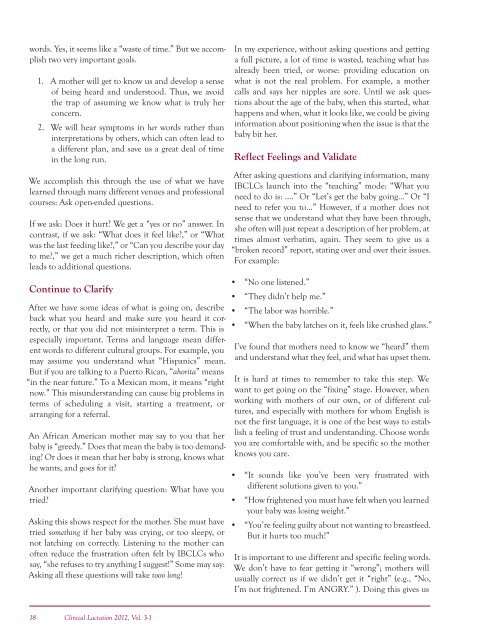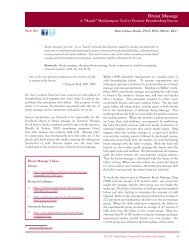Official Journal of the United States Lactation ... - Clinical Lactation
Official Journal of the United States Lactation ... - Clinical Lactation
Official Journal of the United States Lactation ... - Clinical Lactation
Create successful ePaper yourself
Turn your PDF publications into a flip-book with our unique Google optimized e-Paper software.
words. Yes, it seems like a “waste <strong>of</strong> time.” But we accomplish<br />
two very important goals.<br />
1. A mo<strong>the</strong>r will get to know us and develop a sense<br />
<strong>of</strong> being heard and understood. Thus, we avoid<br />
<strong>the</strong> trap <strong>of</strong> assuming we know what is truly her<br />
concern.<br />
2. We will hear symptoms in her words ra<strong>the</strong>r than<br />
interpretations by o<strong>the</strong>rs, which can <strong>of</strong>ten lead to<br />
a different plan, and save us a great deal <strong>of</strong> time<br />
in <strong>the</strong> long run.<br />
We accomplish this through <strong>the</strong> use <strong>of</strong> what we have<br />
learned through many different venues and pr<strong>of</strong>essional<br />
courses: Ask open-ended questions.<br />
If we ask: Does it hurt We get a “yes or no” answer. In<br />
contrast, if we ask: “What does it feel like,” or “What<br />
was <strong>the</strong> last feeding like,” or “Can you describe your day<br />
to me,” we get a much richer description, which <strong>of</strong>ten<br />
leads to additional questions.<br />
Continue to Clarify<br />
After we have some ideas <strong>of</strong> what is going on, describe<br />
back what you heard and make sure you heard it correctly,<br />
or that you did not misinterpret a term. This is<br />
especially important. Terms and language mean different<br />
words to different cultural groups. For example, you<br />
may assume you understand what “Hispanics” mean.<br />
But if you are talking to a Puerto Rican, “ahorita” means<br />
“in <strong>the</strong> near future.” To a Mexican mom, it means “right<br />
now.” This misunderstanding can cause big problems in<br />
terms <strong>of</strong> scheduling a visit, starting a treatment, or<br />
arranging for a referral.<br />
An African American mo<strong>the</strong>r may say to you that her<br />
baby is “greedy.” Does that mean <strong>the</strong> baby is too demanding<br />
Or does it mean that her baby is strong, knows what<br />
he wants, and goes for it<br />
Ano<strong>the</strong>r important clarifying question: What have you<br />
tried<br />
Asking this shows respect for <strong>the</strong> mo<strong>the</strong>r. She must have<br />
tried something if her baby was crying, or too sleepy, or<br />
not latching on correctly. Listening to <strong>the</strong> mo<strong>the</strong>r can<br />
<strong>of</strong>ten reduce <strong>the</strong> frustration <strong>of</strong>ten felt by IBCLCs who<br />
say, “she refuses to try anything I suggest!” Some may say:<br />
Asking all <strong>the</strong>se questions will take tooo long!<br />
In my experience, without asking questions and getting<br />
a full picture, a lot <strong>of</strong> time is wasted, teaching what has<br />
already been tried, or worse: providing education on<br />
what is not <strong>the</strong> real problem. For example, a mo<strong>the</strong>r<br />
calls and says her nipples are sore. Until we ask questions<br />
about <strong>the</strong> age <strong>of</strong> <strong>the</strong> baby, when this started, what<br />
happens and when, what it looks like, we could be giving<br />
information about positioning when <strong>the</strong> issue is that <strong>the</strong><br />
baby bit her.<br />
Reflect Feelings and Validate<br />
After asking questions and clarifying information, many<br />
IBCLCs launch into <strong>the</strong> “teaching” mode: “What you<br />
need to do is: ….” Or “Let’s get <strong>the</strong> baby going…” Or “I<br />
need to refer you to…” However, if a mo<strong>the</strong>r does not<br />
sense that we understand what <strong>the</strong>y have been through,<br />
she <strong>of</strong>ten will just repeat a description <strong>of</strong> her problem, at<br />
times almost verbatim, again. They seem to give us a<br />
“broken record” report, stating over and over <strong>the</strong>ir issues.<br />
For example:<br />
••<br />
“No one listened.”<br />
••<br />
“They didn’t help me.”<br />
••<br />
“The labor was horrible.”<br />
••<br />
“When <strong>the</strong> baby latches on it, feels like crushed glass.”<br />
I’ve found that mo<strong>the</strong>rs need to know we “heard” <strong>the</strong>m<br />
and understand what <strong>the</strong>y feel, and what has upset <strong>the</strong>m.<br />
It is hard at times to remember to take this step. We<br />
want to get going on <strong>the</strong> “fixing” stage. However, when<br />
working with mo<strong>the</strong>rs <strong>of</strong> our own, or <strong>of</strong> different cultures,<br />
and especially with mo<strong>the</strong>rs for whom English is<br />
not <strong>the</strong> first language, it is one <strong>of</strong> <strong>the</strong> best ways to establish<br />
a feeling <strong>of</strong> trust and understanding. Choose words<br />
you are comfortable with, and be specific so <strong>the</strong> mo<strong>the</strong>r<br />
knows you care.<br />
••<br />
“It sounds like you’ve been very frustrated with<br />
different solutions given to you.”<br />
••<br />
“How frightened you must have felt when you learned<br />
your baby was losing weight.”<br />
••<br />
“You’re feeling guilty about not wanting to breastfeed.<br />
But it hurts too much!”<br />
It is important to use different and specific feeling words.<br />
We don’t have to fear getting it “wrong”; mo<strong>the</strong>rs will<br />
usually correct us if we didn’t get it “right” (e.g., “No,<br />
I’m not frightened. I’m ANGRY.” ). Doing this gives us<br />
18 <strong>Clinical</strong> <strong>Lactation</strong> 2012, Vol. 3-1




